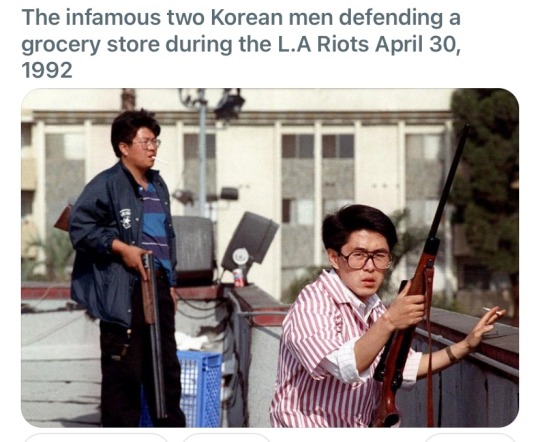#l.a. riots
Video
#los angeles#ferguson#protest#michael brown#lapd#los angeles police department#l.a.#riot police#california highway patrol#chp#flickr
16 notes
·
View notes
Text
Tumblr Blog Website
80's (tumblr.com)
I post 80's content, specifically of rock bands such as Motley Crue, KISS, L.A. Guns, Twisted Sister, Queen, Quiet Riot, Bon Jovi, Guns N' Roses . Every once in awhile I will be posting singles like Amy Winehouse, Freddie Mercury, Brian May, Eric Carr or SLASH.
#80s rock#rock and roll#kiss#motley crue#quiet riot#l.a. guns#twisted sister#bon jovi#guns n roses#queen band#slash gnr#freddie mercury#amy winehouse#brian may#eric carr
2 notes
·
View notes
Text
The Trickle Down of the Trial of the Century
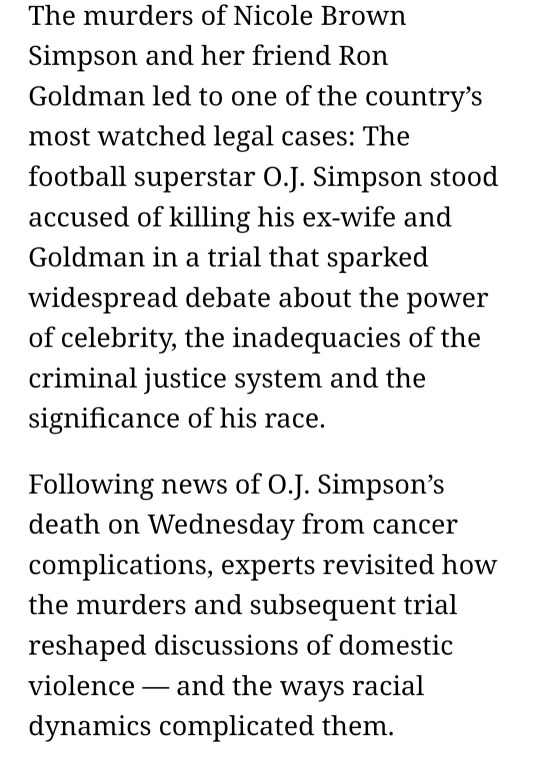
Some said the country saw a major shift on a subject that had historically been framed as a private matter.
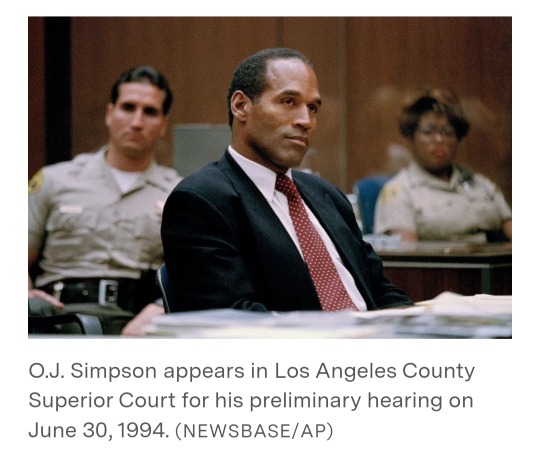
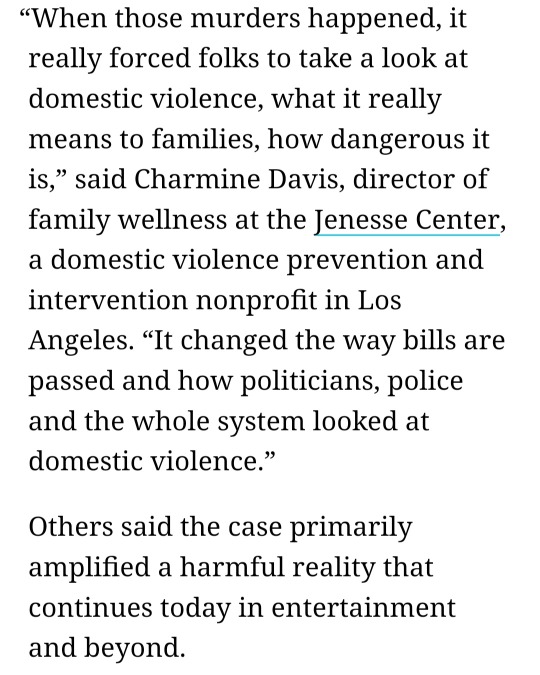


More broadly, advocates reported at the time that the number of donations to battered women's shelters and other women's organizations rose nationwide. The numbers of calls to shelters also increased, indicating that more women were comfortable coming forward about their abuse.
"When we think about the warning signs, especially for progressing to lethal violence, the absolute top early warning sign is strangulation," said Angela Hattery, professor of women and gender studies at the University of Delaware and co-director of its Center for the Study & Prevention of Gender-Based Violence. "Many domestic violence homicides are preceded by strangulation."
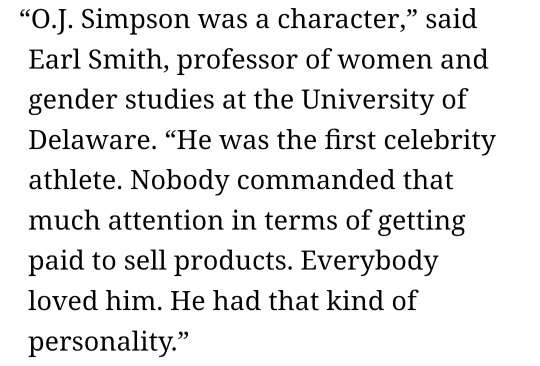
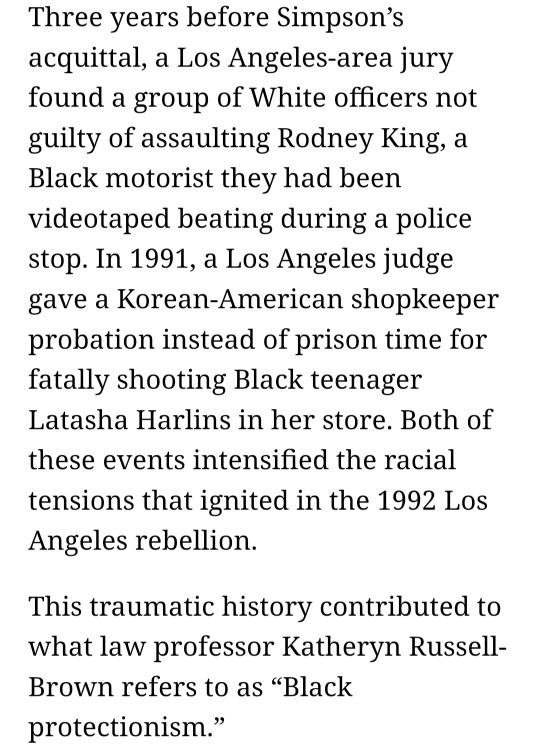

Though media coverage of the Simpson trial widely portrayed Black Americans as being supportive of him, some say that Black people had a complicated relationship with Simpson and that generalizations about the community should be avoided.
"If you remember, Black people had said, 'Well O.J. is not one of us. He's not Black. He's transitioned out of being a Black guy because of who he is, because of the women he dated, because of the woman he married, because of where he lives, because of his notoriety,'" said Davis. "So, it couldn't have been just Black people being happy that O.J. got off."
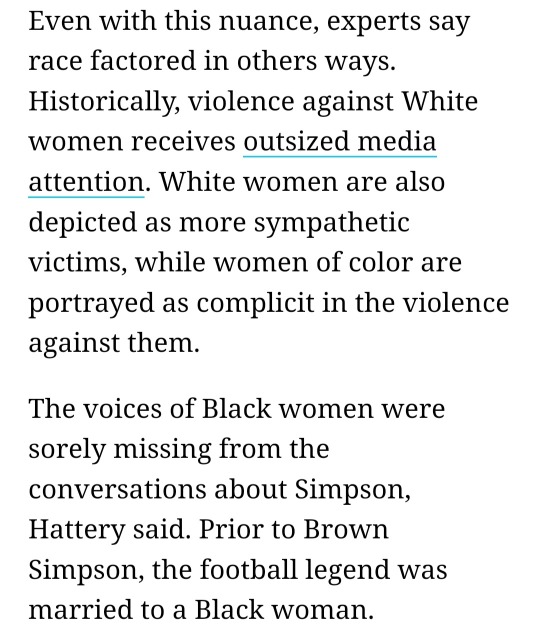
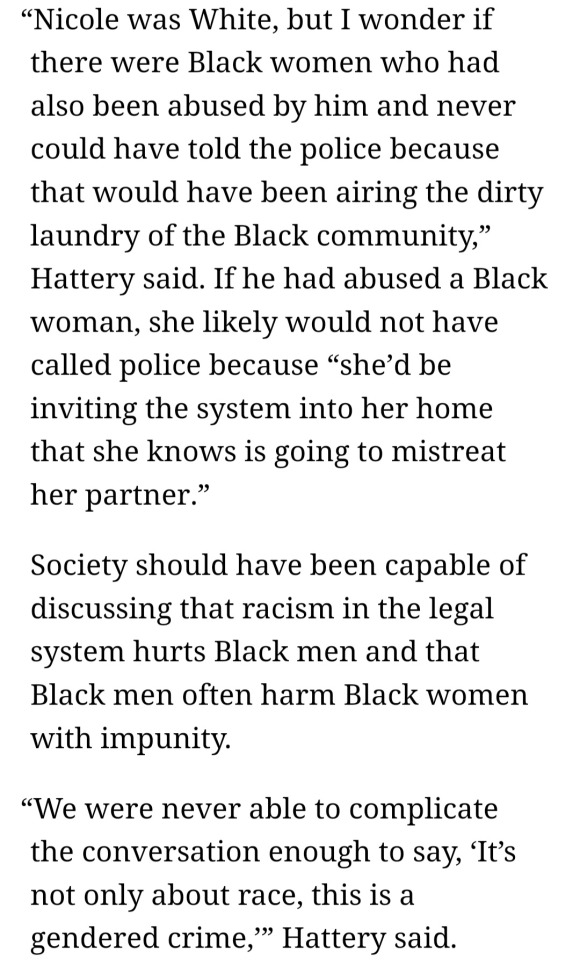
If Brown-Simpson had been Black instead of White would her murder have led to a media frenzy?
"I doubt it," she said. "I see those murders all the time, and they're not televised."
In the political space, nonprofits that serve survivors, such as the Jenesse Center, have to constantly lobby politicians for funding to provide transitional housing and other services. Moreover, survivors who call law enforcement for help too often have their children removed from their homes and placed into the child welfare system.
0 notes
Text
Punk History Resources: Vol 2
This is a compilation of resources found and recommended by various alternative bloggers, each of whom are credited for their contributions. This started because I was getting SO MANY asks about resources such as videos, books, and websites to use to learn about punk history. Admittedly, my own list wasn't that long, so I thought it was best to reach out to some others and share their knowledge with everyone. Now, I'm hoping to make this an annual occurrence, where we all share our knowledge with each other. So thank you again to everyone who helped out with this!!
Link to Volume 1
@whatamibutabutteredcroissant @unfriendlybat @ghost--in-a-machine @mushroomjar
YOUTUBE:
Part 1 of The Decline of Western Civilization (It recieved mixed reception from people in the scene) (whatamibutabutteredcroissant)
Part 3 of The Decline of Western Civilization (Focuses on the gutter-punks of 90s LA) (whatamibutabutteredcroissant)
BOOKS:
Some Wear Leather Some Wear Lace by Andi Harriman and Marloes Bontje (It's mostly goth/horror rock/post punk/deathrock but I feel like it's adjacent enough for it to merit a read) (unfriendlybat)
Spray Paint the Walls: The Story of Black Flag by Stevie Chick (whatamibutabutteredcroissant)
Kids of the Black Hole: Punk Rock in Postsuburban California by Dewar Macleod (whatamibutabutteredcroissant)
We Got the Neutron Bomb: The Untold Story of L.A. Punk by Marc Spitz and Brendan Mullen (whatamibutabutteredcroissant)
Left of The Dial: Conversations with Punk Icons by David Ensminger (whatamibutabutteredcroissant)
The Art of Darkness: The History of Goth by John Robb (A comprehensive history of Goth) (whatamibutabutteredcroissant)
Punk Zines by Eddie Piller and Steve Rowland (whatamibutabutteredcroissant)
The High Desert by James Spooner ( A graphic novel memoir of how the authro came into the scene) (ghost--in-a-machine)
Let Fury Have The Hour by Antonio D'Ambrosio (About the band The Clash) (anonymous submission)
MOVIES / DOCUMENTARIES:
Masque (A 10 minute doc about the Masque club in LA) (whatamibutabutteredcroissant)
ARTICLES:
History of Anarcho-Punk and Peace Punk (mushroomjar)
Late 80s and Early 90s Puerto Rico Hardcore Punk (mushroomjar)
The Jewish History of Punk (mushroomjar)
Japan's Impact on Punk Culture (mushroomjar)
The Forgotten Story of Pure Hell, America's First Black Punk Band (mushroomjar)
The Black Punk Pioneers Who Made Music History (mushroomjar)
Why Poly Styrene is Punk's Great Lost Icon (mushroomjar)
Alternative to Alternatives: The Black Grrrls Riot Ignored (mushroomjar)
Abandoning The Ear? Punk and Deaf Convergences Part II (mushroomjar)
Race, Anarchy, and Punk Rock: The Impact of Cultural Boundaries Within The Anarchist Movement (mushroomjar)
Street Medic Handbook (safety-pin-punk)
ZINES:
Sticking To It (safety-pin-punk)
So You Say You Want An Insurrection (safety-pin-punk)
All Power To The People (safety-pin-punk)
How to Survive a Felony Trial: Keeping Your Head up through the Worst of It (safety-pin-punk)
Collectives: Anarchy Against The Mass (safety-pin-punk)
Social War on Stolen Native Land: Anarchist Contributions (safety-pin-punk)
A Civilian's Guide to Direct Action (safety-pin-punk)
Critical Thinking as Anarchist Weapon (safety-pin-punk)
Security Culture: A Handbook for Activists (safety-pin-punk)
Betrayal: A Critical Analysis of Rape Culture in Anarchist Subcultures (safety-pin-punk)
ETC:
The Anarcho-Stencilism Subreddit (people upload stencils for others to use for free) (mushroomjar)
I would love to make a Vol. 3 post next year, so if you have resources and want to share, PLEASE message me!! (Preferably DMs)
187 notes
·
View notes
Text
Top 10 Spuffy fics I’ve read (Feb 2024)
Dear Slayer by Elsa Frohman [PG-13]
Season 7 AU, based on the speculation that Spike might come back as a "living" vampire.
Drive by Holly [NC-17]
Freshly turned and very grumpy about it, Buffy finds herself in a weird place. One where her friends smell like food, her former mortal enemy smells like heaven, and the so-called love of her life has made it clear that killing her is on his to-do list. Throw in some overly zealous army guys and this is not Buffy's idea of a party. So she and Spike decide to hit the road at least long enough to figure out why neither of them can hit anything else. And since they're both single and free, well, Buffy wouldn't say no to a distraction from the never-ending laugh riot that is her life. And Spike can be very, very distracting.
Good thing soulless vampires can't fall in love or she might be in trouble.
Fireworks by RavenLove12 [NC-17]
The gang is throwing a beach party for the 4th of July in hopes it will lift Buffy’s spirits and help her find a new love. Trouble is she’s already falling for someone they don’t expect.
Found by CupcakeCute [PG-13]
Begins between TGIQ and Power Play, continues post-NFA. Buffy learns of Spike's resurrection from an unlikely source and immediately sets out to make things right as The Apocalypse breaks out in L.A. Spike/Buffy pairing, some Angel/Cordelia.
The Kind of Anticlimactic that's… Not by EllieRose101 [PG]
Hellmouth activity has been almost worryingly absent of late, and with less trouble in Buffy’s life, she’s had nothing stopping her from spending extra time with her lover… Except maybe she has that backwards? (Alternative Season Six.)
Phoenix by EllieRose101 [NC-17]
Spike saved Buffy at great personal cost—something she hopes to repay. (Goes off-canon near the end of Once More with Feeling.)
Ready by sweetprincipale [NC-17]
AU early season 5. Riley and Buffy are still together and something big happened over the summer- a little bundle of joy is on the way. Buffy is not so joyful about how Riley is now treating her. She's ready to be seen as the Slayer and woman she still is, and Spike doesn't object to lending a hand (or other parts).
Spike's Girlfriend by EllieRose101 [PG]
Spike’s in love and the Scooby Gang are sick hearing about it—Buffy most of all. (Alternative Season Six.)
Under The Influence by NautiBitz [NC-17]
A few nights after their engagement spell, Buffy has to watch Spike. Problem is, a psychedelic demon may have just spritzed her with a mind-altering substance. Will Spike seize the moment? Or will they just end up naked? HMMM.
You've Got The Look by Geliot99 [NC-17]
“Buffy?” he mumbled as something soft brushed delicately across his eyelid.
“Don’t open your eyes,” she said quietly, her voice flat with concentration, “or you’ll get poked with the eyeshadow brush.”
He paused, motionless beneath her. “I’ll what now?”
“Just hold still.”
61 notes
·
View notes
Text
Welcome to the hottest 80s band tourney
In this tournament you can submit an band from the 80s here and we’ll see who’s the hottest
Submissions are now closed
Submission requirements
It must be a band no solo artists
I need a list of the members and the instrument they play
They had to have produced at least one album during the 80s
Choose the lineup that you want just make sure that they just all performed together during the 80s
For a list of the lineups check here a quicker list of submitted bands is down below. We are trying to get to 256 submissions so don’t worry about submitting to many bands.
List of submitted bands
will be updated
Guns’N Roses
Mötley Crüe
Queen
Hanoi Rocks
Iron Maiden
Poison
Rush
Anthrax
Possessed
Bon Jovi
Skid Row
Talking Heads
Warrant
The Cure
The Bangles
Def Leppard
The Traveling Wilburys
U2
Dokken
Blondie
Duran Duran
Quiet Riot
Aerosmith
Dio
Metallica
Winger
The Human League
The Clash
Cinderella
Nirvana
The Smiths
The Police
They Might Be Giants
Bruce Springsteen and the E Street Band
R.E.M.
Spın̈al Tap
Tin Machine
Red Hot Chili Peppers
ZZ Top
AC/DC
Beastie Boys
Depeche Mode
The Pogues
Bauhaus
Prince and the Revolution
Joy Division
Fleetwood Mac
Devo
Van Halen
Van Halen (again)
Led Zeppelin
Joan Jett and The Blackhearts
Genesis
Primus
Ramones
Yes
Siouxsie and the Banshees
Kraftwerk
The Alan Parsons Project
Hall and Oates
Echo and the Bunnymen
Tears for Fears
The Psychedelic Furs
Misfits
Living Colour
XTC
Adam and the Ants
Run-DMC
King Crimson
Public Enemy
KISS
N.W.A.
Whitesnake
Black Sabbath
Deep Purple
L.A. Guns
W.A.S.P.
Pantera
Styx
B-52’s
Vixen
The Go Go’s
The Residents
Pretenders
Tom Petty and the Heartbreakers
Asia
Jethro Tull
Green Day
Journey
Wham!
Pet Shop Boys
The Who
Scorpions
Heart
Ratt
The Beach Boys
Queensrÿche
The Cars
Foreigner
Marillion
GWAR
Max Webster
Twisted Sister
Stray Cats
Megadeth
The Stone Roses
Slayer
Operation Ivy
Bam Bam
Cybotron
Steve Miller Band
The Highwaymen
10cc
Fugazi
Minor Threat
Dead Kennedys
Blackfoot
Stevie Ray Vaughan and Double Trouble
Dire Straits
Electric Light Orchestra
The J. Geils Band
Judas Priest
Motörhead
Crosby, Stills, Nash, & Young
Elvis Costello and the Attractions
Chicago
The Replacements
The Kinks
Pixies
Men at Work
Stryper
Faster Pussycat
Thin Lizzy
Grateful Dead
Sepultura
Bananarama
Nine Inch Nails
Foghat
Blue Öyster Cult
Culture Club
Tesla
Soundgarden
Berlin
Boston
Public Image Ltd
Pink Floyd
The Professionals
Starship
REO Speedwagon
Extreme
Shonen Knife
Night Ranger
De La Soul
Salt-N-Pepa
Earth, Wind & Fire
X
X Japan
The The
The Time
Steely Dan
Godley & Creme
The Tragically Hip
Dexys Midnight Runners
The Cross
Sonic Youth
Roxy Music
The Rolling Stones
Hüsker Dü
DJ Jazzy Jeff & the Fresh Prince
New Kids on the Block
Huey Lewis and the News
Eurythmics
A Flock of Seagulls
The Blues Brothers
Love and Rockets
Strawberry Switchblade
Los Lobos
Santana
Oingo Boingo
Grandmaster Flash and the Furious Five
A-ha
Crack the Sky
Crowded House
Yellow Magic Orchestra
Eric B. & Rakim
Commodores
Nick Cave and the Bad Seeds
KIX
White Zombie
UB40
Great White
Bruce Hornsby and the Range
White Lion
.38 Special
The Tubes
Utopia
The Sugarcubes
Faith No More
Throbbing Gristle
Ministry
'til tuesday
Sparks
Bob Seger and the Silver Bullet Band
The Oak Ridge Boys
The Judds
Dinosaur Jr.
The Moody Blues
Pat Metheney Group
INXS
Status Quo
Melvins
Pandora's Box
Orchestral Manoeuvres in the Dark
New Order
Meat Puppets
Descendents
The Fall
Spandau Ballet
Thompson Twins
Tom Tom Club
Jane's Addict
Bob Marley and the Wailers
Modern English
Cutting Crew
My Bloody Valentine
Black Flag
Wire
The Cult
The Jesus and Mary Chain
The Specials
Missing Persons
Simply Red
The Romantics
Madness
Violent Femmes
Skinny Puppy
Cocteau Twins
The Damned
Simple Minds
Frankie Goes to Hollywood
TISM (This Is Serious Mum)
The Cockroaches
The Allman Brothers Band
Cold Chisel
Midnight Oil
NOFX
The Crucifucks
America
Bad Religion
Helloween
Mother Love Bone
The KLF (a.k.a. The Justified Ancients of Mu Mu, a.k.a. The Timelords) [same group, just used numerous names]
Dog Police
Frank Chickens
Men Without Hats
Europe
Can I submit propaganda?
Not right now. If you do I won’t post it until the polls start which looking right now could be a while.
But it will be posted eventually
can I submit more than one band?
yes!! Go wild
Some blogs that inspired this
@billboard-hotties-tourney
@the-80s-music-colosseum
#80s bands#80s music#80s glam#80s metal#80s rock#tournament poll#tumblr tournament#The hottest 80s band tournament#80s pop#80s post punk#80s country#80s#1980s#eighties
45 notes
·
View notes
Text
Meghan’s Lies
by request of @britishroyalfamilyvideos
Not comprehensive - this is just what I’ve tracked and they are not in any order. If I’ve missed any, add to the comments.
Meghan grew up an only child, never had any kind of relationship with Sam or Tom while growing up.
Meghan grew up in near-poverty where the $5 Sizzler buffet was a splurge.
Meghan didn’t know who Diana or the Royal Family was.
Meghan didn’t know that Diana did the Panorama interview.
Meghan told a television production she was union when she actually wasn’t.
Meghan’s character was being written off Suits because she was marrying Harry. (She was actually written off because Patrick Adams wanted out and her character was tied to his storylines.)
Meghan doesn’t have any family except Doria.
Meghan paid for college herself with her own student loans. (Thomas did; has receipts.)
Meghan has degrees in international relations and theatre from Northwestern University. (It’s actually a degree in communications, according to the commencement booklet.)
Meghan hated Britain because they were racists.
The Sussexes were more popular in Australasia than the Cambridges were.
Meghan didn’t want to serve newborn Archie on a silver platter to the British media.
Meghan wasn’t allowed to do a photocall at the hospital after Archie was born.
Meghan never talked to Oprah before Megxit.
Meghan wasn’t working with UK Vogue on a special edition.
Meghan couldn’t wear the same color of clothing as anyone else.
Meghan could only wear neutral-colored clothing.
Meghan was never going to dress her children like Kate’s Victorian ghost dolls.
Meghan was going to get her UK citizenship.
Meghan gave up her Hollywood team.
Meghan didn’t want a big public wedding and was forced into the big public spectacle by the royal family.
Meghan and Harry eloped three days before the Windsor spectacle with the Archbishop of Canterbury in their garden at Kensington Palace.
Meghan loves her engagement ring.
Meghan and Harry received permission from The Queen to name their daughter Lilibet.
Meghan loves Africa.
Meghan is committed and passionate about charity work and philanthropy.
There are no tabloids in the U.S.
All Americans have a rude, demanding, and 5am work ethic.
Paparazzi car chases
(All the times Meghan plagiarized quotes from others in her speeches)
Meghan frequented Korean spas in L.A. as a child.
Meghan didn’t collaborate with Scobie on Finding Freedom.
Meghan didn’t expect Thomas to publish her private letter.
The royals were the family Meghan never had.
The royals never welcomed Meghan into the fold.
The royals never gave Meghan any kind of help or training.
Meghan gave up everything for Harry.
Meghan didn’t announce her pregnancy at Eugenie’s wedding.
Meghan loves kids and couldn’t wait to be a mom.
Meghan’s dog was too old to fly overseas.
Meghan wasn’t allowed to decorate their home with items from the Royal Collection.
Kate made Meghan cry.
Meghan had a warm, friendly relationship with The Queen.
Meghan is the best boss ever.
Meghan made her own banana bread in Australia. (It was the Governor’s House chef.)
Meghan had suicidal thoughts the night of the Cirque du Soleil event and couldn’t stop crying at the event.
The royal family never helped Meghan with her mental health.
Meghan is being advised by the Obamas post-Megxit.
The children were refused titles by the BRF because they were racist.
Meghan refused titles for the children.
Meghan had a fish tacos lunch with Michelle Obama.
Meghan was pen pals with Hillary Clinton. (We know now that Thomas intervened on this.)
Meghan witnessed the LA riots.
Meghan supports independent grassroots journalism.
Meghan was going to hit the ground running in Britain after the wedding.
Her height. (She claims to be 5′6...maybe in heels.)
Meghan worked at the US embassy in Argentina. (She did a summer study program and ended up dropping out.)
Meghan didn’t know she had to curtsy to The Queen.
The BRF took her passport and car keys after the wedding and never let her travel.
Meghan wasn’t allowed to leave Nottingham Cottage or Frogmore Cottage unless it was for a work engagement.
They were evicted from Frogmore Cottage. (Netflix docuseries shows they were moving out June 2022.)
Meghan was concerned for her privacy in London and wanted to move back to L.A. because there were no paparazzi.
Archie was denied 24/7 protection by the royal family because he didn’t have a HRH and wasn’t a prince.
The family gossiped about Archie’s skin color and made racist comments to her about him.
The palace forced Meghan to take her name off Archie’s birth certificate. (Archie’s first birth certificate had his mother as Rachel Meghan, HRH The Duchess of Sussex. This birth certificate was later amended to have his mother as HRH The Duchess of Sussex.)
There was egg in the wedding food.
Meghan wasn’t allowed to have scents in St. George’s Church. (She wasn’t allowed to spray perfumes, but could have candles.)
The palace has Archie’s birth certificate locked under file and won’t give it to Meghan, so she can’t register him for school.
Meghan wasn’t allowed to do hair trials with her wedding tiara by Angela Kelly.
Meghan was the new Bond Girl.
Fire in Archie’s nursery in South Africa.
Meghan said titles are not important - people should be linked, not ranked.
Archie was too young to fly to Balmoral after he was born. (And yet they took him on 4 international private flights with Elton John...)
Meghan lied about her age. (This was while she was a working actress in Hollywood. Her age has been corrected so it’s not really a lie anymore.)
Belly padding during the pregnancy with Archie.
Sussex Royal had organic innate popularity on social media. Absolutely no bots were involved at all!
Circumstances of the miscarriage. (There are four different stories out there.)
Zoom calls with the Cambridge children during COVID lockdowns.
Zoom calls with The Queen during COVID lockdowns.
Flowers on Philip’s casket were from the Sussexes.
The Sussexes were invited to the Beckham wedding.
Lili would have a royal christening with The Queen.
Lili was christened.
The Sussexes were invited to the diplomatic reception held before The Queen’s funeral.
Meghan is best friends with Jennifer Aniston and they walk their dogs together all the time.
The children’s appearances are often edited/Photoshopped in published photographs.
Edit: More from the comments - credit to the blogs
Meghan didn’t have friends in school. (@rosesandmoonstones)
Meghan was prom queen. (@rosesandmoonstones)
Circumstances of the “racist royal” remarks (@scorpiotwentythree)
Meghan received a standing ovation at the UN, led by Ban Ki Moon (@scorpiotwentythree!)
The type of ambassador role Meghan had for the UN pre-Harry.
Meghan met The Queen in Balmoral over tea just after starting to date Harry in mid-2016. (@scorpiotwentythree)
“No one asked me if I’m okay.” (@rosesandmoonstones)
Meghan didn’t know racism till she arrived in the UK. (@jillydillypickles)
South Africans danced in the streets for the Sussex wedding. (@jillydillypickles)
217 notes
·
View notes
Text
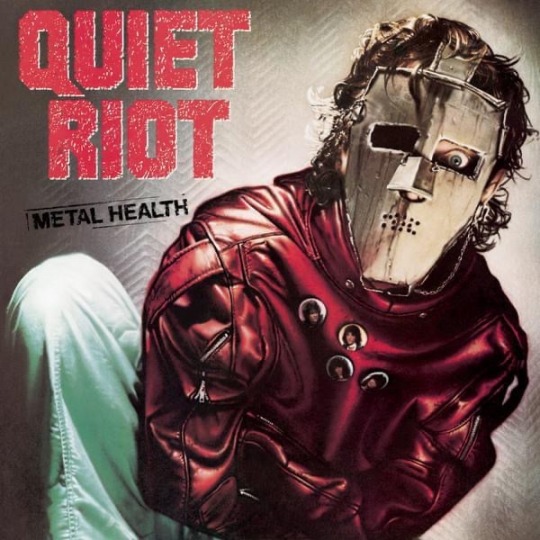
This week in 1983, Quiet Riot learned that METAL HEALTH had officially hit #1 on the US album charts. It was the first heavy metal album in history to achieve that level of success, and it is widely thought to be responsible for bringing the L.A. music scene into the national spotlight.
#heavy metal#80s music#80s metal#80's music#80s#80 s music#80’s#quiet riot#kevin dubrow#metal health#1983 music#1983
106 notes
·
View notes
Text
Interview with Jonathan Bailey and Matt Bomer from GQ Hype
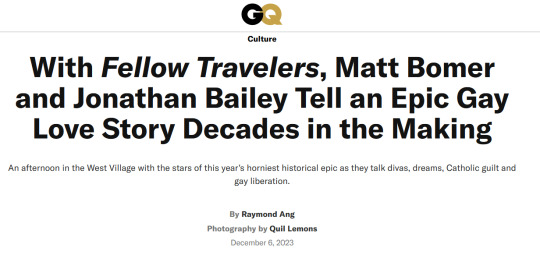
Filled with cozy, Hemingwayesque signifiers of midcentury masculinity (think: taxidermy and artfully-tattered boxing gloves), the restaurant seemed perfect for a breezy, late-autumn hang in the West Village.
But there’s one problem: Matt Bomer and Jonathan Bailey have burgers on their minds. And while this place boasts a surplus of dead animals nailed to the wall, it somehow only serves snacks and salads in the afternoon. And as Bomer points out, Corner Bistro—a pub that, in his opinion, serves some of the best burgers in town—is just a six-minute walk away.
The British-born Bailey—who, in his black sweater, floppy beanie and overstuffed backpack, looks more like a backpacker who just rolled out of his hostel rather than one of the streaming era’s top heartthrobs—waxes rhapsodic about In-N-Out, the California burger institution, which he recently tried for the first time.
He asks the suave, Old Hollywood-handsome Bomer, who spends most of his time in L.A. with his husband and three teenage sons, where In-N-Out falls on his personal burger index. “Our boys are really good judges of burgers,” Bomer says, and for them, In-N-Out is up there—but so is the burger at Corner Bistro. And how can we send Bailey—the Viscount of Bridgerton himself—back to London without tasting New York’s best?
Our location, midway between Stonewall Inn and Julius, two of New York’s most historic gay bars, is apt. The project we’re here to talk about—the epic new Showtime series Fellow Travelers, in which the pair star—tips its hat to the legendary 1969 riots that happened in Stonewall, but goes even further, telling the story of gay liberation in the second half of the twentieth century.
Part epic love story, part political thriller, Fellow Travelers begins in 1950s Washington, D.C., with an illicit affair between the strapping Hawkins “Hawk” Fuller (Bomer), a State Department official savvy to the ways of power, and the earnest, energetic Timothy “Tim” Laughlin (Bailey), the kind of wide-eyed idealist who goes to D.C. wanting to change the world. When they first meet, Tim is a conservative Catholic boy; his passionate, intensely erotic affair with Hawk both liberates him and throws him off his path.
Through the decades-spanning run of their relationship, the series takes us from the Lavender Scare of the 1950s—when a McCarthy-era policy that institutionalized homophobia expelled many “sexual deviants” from government, resulting at one point in a suicide a day—to the AIDS crisis of the 1980s.
The series is based on the Thomas Mallon novel of the same name. But where Mallon’s book generally focuses on the 1950s and the explosive romance between Hawk and Tim, the series expands the Fellow Travelers universe to reach through the decades and cover the Vietnam War protests of the '60s and the White Night riots of 1979.
“It's been taught that LGBTQIA+ history begins at Stonewall,” says Jelani Alladin, the actor who plays queer Black journalist Marcus Hooks in the series. “It’s a kind of false narrative. Queer people have been around taking a stand for themselves since the beginning of time.”
It feels like a disservice to call a series so sexy and so compelling as educational. But Fellow Travelers does serve as an important history lesson for younger generations who may not fully understand the battles fought before their time. “It was a really dark period in American history that obviously we're not taught in school,” says executive producer Robbie Rogers, who prior to his work in film and TV was the soccer player who became the first openly gay man to compete in a North American professional sports league. “We're not taught LGBT history.”
When the first episode of the series came out in late October, a viral clip showcasing Bailey and Bomer in a particularly kinky sex scene had Gay Twitter shuddering with excitement. In the scene, Bailey’s Tim uses his power as a sub to persuade Bomer’s Hawk to take him to an important D.C. party. “I’m your boy, right?” he tells Hawk. “Your boy wants to go to the party.” In surely one of this year’s hottest scenes on film or TV, we see Bailey hungrily suck on Bomer’s toes and gamely attempt to put his foot in his mouth. Earlier in the series, Hawk gives Tim the name “Skippy” after thoroughly dominating him in bed, a gesture of affection as much as of ownership.
Sex is a powerful, world-shifting force in Fellow Travelers, but it’s also a Trojan horse. While the early episodes bristle with erotic energy, every exchange between Bomer and Bailey is about power as much as it is about sex. And the further you go into Travelers, the more you realize what’s really at stake when these two hit the sack.
“Even in the ‘50s, they had joy,” Travelers creator and writer Ron Nyswaner, the Oscar-nominated screenwriter of Philadelphia, says. “You might be struggling, but that doesn't mean every moment of your life you're a victim of oppression. Behind closed doors they had a life—it's just that at any moment, the police could come through those doors and ruin that life.”
That unapologetic approach to queer desire is still pretty revolutionary in a big-budget prestige series on a major network. Gone are the days when gay characters were allowed to exist onscreen as long as they adhered to respectability politics. In Fellow Travelers, the queer characters are allowed passionate, unapologetically freaky pleasures.
“There's no shame attached to that,” Bailey says. “And I do think Matt's character detonates something in Tim. It's a gift to meet someone [who does the] radical act of helping you feel less shame and understand that intimacy that can be explored in so many different ways.”
Religion is a big theme in Fellow Travelers. Hawk is bound by covenant to his wife; Tim struggles with Catholic guilt. And like many queer people, Bomer and Bailey themselves have both had to negotiate religion within their queer identities.
“It took me a long time to dismantle it and to question what I was being told,” Bailey says. “Religion is interesting because it’s the voice of the shame but also [a source of] relief. There was this person that I could speak to—and I definitely did have that full conversation with a higher power. But the contradiction is brutal. To really lean into that as a gay kid who's not born into a gay family, you see both sides of what religion can provide, which is scathing judgment—as I felt it looking back—but also a real space for catharsis and nourishment.”
Bomer says he has an individualized approach to religion: “It's something that I've found for myself over years and years of exploration. It's just highly personal that way.” Bomer is proud to have raised his kids in a truly intersectional environment. “They go to an Episcopal school, but they're in school with Muslim kids, with Jewish kids,” he says. “We gave them that experience and then let them find their own way from there.”
On the way to Corner Bistro, Bomer gives Bailey a capsule tour of gay West Village. “That’s an iconic lesbian bar,” he says, pointing out Cubbyhole on West 12th street. Later, he asks if we’ve ever been to Fire Island. “You can have any experience you want there,” Bomer tells me, when I confess my anxiety around Speedos. “It's not just one thing.”
These streets bring up certain memories for Bomer. He tells us about coming up as an actor in New York in the early 2000s, at one point living in “a renovated crackhouse in Brooklyn.” Later, he worked two jobs to afford a one-bedroom apartment he split with a fellow aspiring actor—none other than Lee Pace, the famous, and famously tall (6′ 5″, if you don’t know), actor and Internet Boyfriend who Bomer has known since high school. “I’ll tell you how long I've known Lee Pace,” he says. “I’ve known him since he was shorter than me, when he was 14 and I was 15.”
As gay men are wont to do, trust that the group veered off-topic to talk about vocally-prodigious divas. Bomer has just seen the Broadway production of David Byrne’s Here Lies Love, which tells the story of the rise and fall of Imelda Marcos, the wife of the Philippine dictator Ferdinand Marcos. And when he finds out that I grew up in the Philippines, he tells me how much he loves Lea Salonga, the Tony-winning Filipino Broadway star who appears in the production.
We ask Bailey if he’s familiar with her. “Do I know Lea Salonga?” he asks. “She was Fantine!” he retorts, referring to her role in Les Misérables in Concert: The 25th Anniversary.
From there, we fall into a Filipino diva rabbit hole, talking about former Pussycat Doll Nicole Scherzinger (currently appearing in a well-received West End production of Sunset Boulevard that Bomer tells Bailey they must catch together), Mutya Buena of the Sugababes (an iconic U.K. girl group that Bailey and I separately saw live recently), and Darren Criss (who Bomer directed on The Assassination of Gianni Versace: American Crime Story—technically a straight male, but one who earns diva status for his formidable vocals and the dance he did in a red speedo on Versace).
As we near the pub, a thirty-something woman walking hand in hand with her man does a hilariously convincing impression of the Distracted Boyfriend meme at the sight of Neal Caffrey and Anthony Bridgerton casually strolling through West 4th Street.
“Her neck!” Bailey says, audibly concerned.
In Corner Bistro, with sandwiches and coffees in hand (Bailey decides on a classic burger and a grilled chicken sandwich), we settle down in a cozy booth and talk about the points in their careers where Fellow Travelers found the actors, the hard-won representation Hollywood’s queer community has been fighting for for decades, and the LGBTQ+ talents of color they’d like to support on their own projects.
Bomer, of course, has been famous since the early 2010s, when he became a star on the series White Collar, and along with Neil Patrick Harris, proved that openly gay actors could become leading men. Since then, he’s conquered Broadway (The Boys in the Band), won a slew of awards (Golden Globe and Critic's Choice trophies for The Normal Heart) and become a producer and director.
In the past, Bomer has discussed the way doors closed on him even as he was being celebrated for being an out gay actor. When asked about that now, he says, “I choose just to never look back in anger about anything. Ultimately, my career is a lot richer because I decided to be open with who I am.”
“It’s a wave of progress that Matt's been surfing and is at the front of,” says Bailey. “And it's been a real honor to be able to get on my boogie board next to him.”
Before he became a global star mid-pandemic playing the grumpy, furry-chested Anthony Bridgerton on the Netflix juggernaut Bridgerton, Bailey was an award-winning actor in both the West End and British television. Huge fame didn’t find Bailey until his early 30s, so when it did, he had a clear idea of what he wanted to accomplish with his platform.
“I feel the responsibility immeasurably,” Bailey says. “I get it when people are saying you create a chair and bring people [to the table].” He talks about the connection between the civil rights movement and the queer liberation. “The Black queens are the ones who really started to fight,” he says. “It's amazing to feel politically activated. And if there's any project to do that, it's going to be Fellow Travelers. It will change the way I see myself in and the world I live in.”
The intersectionality makes the story Travelers is trying to tell even richer—most of all in Alladin’s scene-stealing portrayal of the conflicted Marcus Hooks, a pioneering Black journalist who pushes against segregation as he grapples with his own sexuality. “When I look at older men today, I'm like, You guys have endured so much,” Aladdin says. “From the Second World War all the way through to the AIDS crisis, it was nonstop life crisis after life crisis. To have been able to survive through all that, there needs to be a real, solid weight on the feet of [these characters].”
Part of the pleasure of watching Fellow Travelers is picking up on the cinematic references hidden in each scene. Hawk and Tim’s first interactions evoke the forbidden affair in David Lean’s 1945 classic Brief Encounter. When Hawk’s family settles in suburbia, the show evokes the Technicolor repression of the great Douglas Sirk melodramas. When Hawk and Tim run through the beaches of Fire Island in the ‘70s, that iconic image of Burt Lancaster and Deborah Kerr kissing on the beach in From Here to Eternity may flicker in your mind. And in some ways, the series plays like a gayer, hornier The Way We Were—an epic love story tossed on the tides of political change. (In this version, of course, the Barbra Streisand character is an eager foot-licking sub and Redford’s Hubbell Gardiner is a daddy with a pit fetish.) Fellow Travelers allows us to imagine an alternate timeline where queer love has always gotten as much screen time as cinema’s great heterosexual romances, giving other kinds of stories the chance at celluloid immortality too.
In the book, Hawk is described as being more handsome than Gregory Peck. But seeing Bomer in period-appropriate clothing, the Old Hollywood leading man I thought of was Montgomery Clift, the talented and ultimately tragic gay actor who starred in classics like Red River and A Place in the Sun. For a time in the mid 2010s, Bomer was attached to star in a Montgomery Clift biopic for HBO, to be directed by the great gay director Ira Sachs. “Ira is a genius,” Bomer says. “[But] I think that ship may have sailed.”
Still, when I press him about doing it in the future, he lights up. “You know, I’m [now] the same age Monty was when he passed away,” Bomer says. “I always thought it'd be really interesting to do a play about the last night of his life, when he's watching one of his old movies on TV. And he had this man who lived with him and took care of him for the last chapter of his life.There's an interesting play in there somewhere…. Maybe Liz Taylor swings by.”
What’s changed since the mid 2010s is that a lot of Hollywood’s current gatekeepers are queer people who were fighting from the bottom a decade ago. “It's the people, the gatekeepers who are now going, ‘We are going to make this [queer] story,’” Bailey says. “This narrative that gay people have to be closeted in order [for a project] to be commercial and in order for things to be interesting to people—it's been dismantled. But it's slow because it's not just straight people who think that—I think everyone believed that in the system of Hollywood.”
Nyswaner, who has been working in Hollywood since the early ‘80s, has seen that shift up close. “When I grew up in the ‘60s and early ‘70s, I never heard the word ‘homosexual’ spoken aloud,” he says. “There was no conversation that I ever had with anybody about homosexuality. It was not just bad, it was the unspeakable thing—that's how terrified people were of us.”
And while he agrees that, in some ways, it feels like the LGBTQ+ community is once again losing ground on some rights, Nyswaner refuses to accept that there hasn’t been change. “Sometimes I hear people say, ‘Well, we haven't gotten anywhere.’ And I'm here to say, ‘Oh, yes, we have.’ Because actually you can turn on the television and find gay characters.”
Fellow Travelers is the culmination of a dream for a number of the men involved in the series.
“When I met Ron, he was talking about how he thinks about this as his lifelong legacy project,” Bailey says. “And I just said to him, ‘Whoever ends up going on this journey with you, I think it'll be the same [for them] probably.’”
“In some ways, Fellow Travelers is a span of my life,” Ron Nyswaner says. “I was an infant in the McCarthy era. And then I came out of the closet in 1978 and just danced and did cocaine and had multiple sexual partners—we didn't know what was coming, which was the AIDS crisis.” Nyswaner was nominated for a Best Original Screenplay Oscar in 1993 for Philadelphia, the landmark drama about an AIDS patient who sues his employers for AIDS discrimination. In a way, the historical span of Fellow Travelers gives the battles fought in Philadelphia their context.
Rogers remembers being a closeted soccer player in the late 2000s, watching Tom Ford’s A Single Man and hoping one day to be able to find love and take control of his own narrative. And Bailey recalls, post-Bridgerton, realizing that he could suddenly write his own destiny and vowing to seek out “a sweeping gay love story.”
Bomer, meanwhile, says—laughing, but seemingly dead serious—that it’s his goal to play a queer character from every decade of the 20th century. “A queer Decalogue,” he says, referencing the Krzysztof Kieślowski classic.
Bomer’s next project might just help him do that. He’s currently producing a Steven Soderbergh film on Lawrence v. Texas, the case that overturned the sodomy laws in Texas in 2003 but started in the 90s.
There are many more stories to tell. And as our interview winds down, Bomer and Bailey start spitballing dream projects.
We talk about All of Us Strangers director Andrew Haigh, who’s revered for his portraits of gay intimacy. “Andrew Haigh has been a special filmmaker for years,” Bailey says. “I think [his film] Weekend informed actually how I approached the sex scenes in [Fellow Travelers].”
“I’d love to play Jessica Fletcher's queer grandson who moves back to Cabot Cove,” Bomer says, referencing Angela Lansbury’s iconic role in Murder, She Wrote. “He's inherited her house and he finds an old journal in her library, and it's a case she never saw and he takes up her mantle.”
And moments before the restaurant speakers suddenly start blaring George Michael’s “Freedom ’90,” Bailey comes in with a killer pitch: “I’m obsessed with the Sacred Band of Thebes, an army of 300 gay lovers in [ancient] Greece. They partnered in pairs, this gay army, and they overthrew a Spartan army… I want to do that as a comedy.”
“Oh hell yes!” Bomer says.
“Just get all the queer actors together,” Bailey says, laughing.
“Lee Pace, everyone,” Bomer says.
“Where would we film it?” Bailey asks.
“Mykonos?” Bomer suggests.
“Flaming Saddles, down the road,” Bailey counters with a chuckle, referring to a gay bar in midtown.
“Oil us up and let’s go!” Bomer says.
Source
#fellow travelers#jonathan bailey#matt bomer#jelani alladin#ron nyswaner#interviews#interviews:2023#GQ hype interview 2023#NEW!
63 notes
·
View notes
Text
Fuck It Friday
I have pulled myself from the exhausted hellscape in which I reside because @princessfbi and @alliaskisthepossibilityoflove tagged me and so, I bequeath you with this:
“You love being the guy who fixes things,” Sean says.
If anyone else said that Buck would either bite their head off or hunch his shoulders inward, retreating, shamed. When Sean says it… there’s something soft underneath. Something Buck feels like he can hold onto.
Fixing people is hard. And a lot of the time, there’s nothing you can do. Buck knows. He’s tried. His parents. Abby. Maddie.
But cars? Cars you can fix. You can’t save a person’s marriage, or their mom, or make them love you, but you can tinker with the engine and adjust the axel and rotate the tires, and then at least you’ve fixed one thing.
Buck shrugs, because what’s he gonna do, deny it? “Bobby seems to think I’m good at it.” Bobby also wishes Buck would stick to the garage and not go out racing, though, because Bobby thinks he’s made of fuckin’ china.
Sean frowns at him. “You know he loves you, right?”
Buck rubs at the back of his neck. “I totaled his car.”
“I once scratched our car up,” Sean notes. “I was a kid and my mom was in labor with my little sister. Adriana. Dad was at work, and so I panicked and I got into the car, I figured it couldn’t be too hard, right? I drove it into the wall.” Sean laughs, rueful. “You know what my dad did?”
“Read you the riot act?”
“But good.” Sean shakes his head. “My ears were ringing by the time he was done. He yelled about the house, about the car, about my mom. You know what he never once did?”
Buck waits.
“He never once yelled at me about me.” Sean stares out into the distance, at something Buck can’t see. Maybe he’s peering through time. “He never once asked if I was okay, or told me I could’ve hurt myself.”
Buck’s throat feels tight. His whole chest is tight.
“My dad loves me. I know that. He’s not great at showing it. I moved to L.A. for a reason.” Sean shakes his head like he’s dusting away cobwebs and looks Buck in the eye. “I heard you and Bobby, and I’ve heard about the crash, and not once, ever, has Bobby mentioned his car. Anything about it. The only thing he ever talks about is you. I don’t think he cares that you’re a good or bad racer or what you did or might do to a car, Buck, he cares that you almost lost your fucking leg.”
*crawls back into the hellscape*
#mads writes stuff#buddie#buddie fanfic#princessfbi#alliaskisthepossibilityoflove#in two and a half weeks I will be free... (i.e. my promotion kicks in)#if I can just survive until then...#some of you might be wondering who 'Sean' is#heh heh heh
47 notes
·
View notes
Text
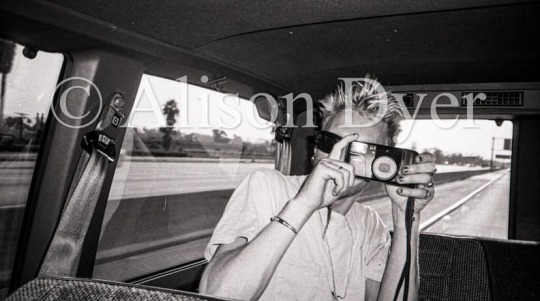
Rare picture of Layne Escaping from the L.A Riots on the way to Joshua Tree.. in the ack of Tom Araya's car :)) ©️1992
📸 By Alison Dyer
#layne staley#alice in chains#tom araya#slayer#90s#rock#metal#legend#90s vintage#vintage picture#rare pictures#aic#grunge#legends#heavy metal#jerry cantrell#layne thomas staley#60s 70s 80s 90s
38 notes
·
View notes
Note
where OJ Simpson died , what your thoughts on his abuse of his two wives and nicole brown and rod goldman's families , i know every women of color experience domestic violence , i saw black women cheer that oj is dead, has gotten away from murder
I wish I had something more poignant to say, but when I heard about OJ Simpson’s death the only things I thought about were,
1) Nicole Brown Simpson. She was a victim of femicide, and unfortunately,
2) I cannot help but remember how fucking mad white people were. Literally for years afterwards. And I’m not trying to excuse OJ or anything, but I was a kid when all that happened. Like not even a teenager. And I remember being interrogated by my white school mates, and I also remember being treated a lot more harshly than normal by my white teachers (lol, and I can count on one finger the number of Black teachers I had from kindergarten to high school)
For clarity, I dO believe that OJ murdered Nicole and her boyfriend and I am not making excuses for OJ
I just keep thinking about how the L.A. riots happened only two years prior, and how A LOT of the racist cops involved in OJ’s arrest were patently racist — they caught Mark Furman on audio tape freely slinging the n-word, and other (white) cops were totes cool with that
White people were sO fucking angry. Like, not angry because a woman was murdered, but because it was a Black man who murdered her, a literal blonde haired Guinevere
It was the same kind of whitelash that got Emmett Till murdered, and the same kind of white anger that landed the Central Park 5 and countless other Black men in prison. If Nicole was a Black woman (or if OJ was white), I doubt white people would have even taken notice
Again, I’m not caping for OJ Simpson. He definitely murdered Nicole, and there isn’t a poor Black man alive who would have gotten off like OJ did
FWIW, I personally do not know any Black women who cheered at his death, but then again, his death is a non-issue and it hasn’t come up too much (not at all, really) amongst my family and friends, and it’s almost beyond my generation
And I just wanted to add some context for the jury verdict that let him off the hook, because in my experience there’s this unwritten cultural thing in America where, whenever any non-Black person asks a Black person about OJ, they are really just expecting a simple admonition of “bad dark skinned Black man,” without digging any deeper and recognizing context like what had just happened to Rodney King and the L.A. riots —they ask Black people about OJ kind of like how whenever a media pundit “randomly” asks every single Muslim they encounter if they condemn Hamas)
(SN: And even if OJ hadn’t murder anyone, I never liked him ever since I read where he once said, “I’m not Black, I’m OJ” … I genuinely detest other Black people who are so desperate for the white gaze that they hate their own Blackness and would sell out Black people for their own self enrichment)
It’s wild af that every time I’ve heard about his death, it’s like listening to a highlight reel of his career, almost without any mention of Nicole or Ron Goldman’s murders
The United States has a big fucking problem with femicide
And misogyny
And racism
And racialized misogyny
I would say that OJ’s death would be a great opportunity to raise awareness about femicide and domestic violence and intimate partner violence, but America is so blind or indifferent to the role that ingrained racism plays, I wouldn’t trust the disproportionately overwhelmingly white media to not fumble it
Yeah, anyway, I have always believed that if the police hadn’t had such a long ass + well documented history of being abject liars and racists, Nicole might have gotten the justice she deserved
I hope that OJ’s death brings some semblance of peace to the families of Nicole and Ron
#anon#ask#answered#oj simpson#femicide#nicole brown simpson#nicole brown#domestic violence#intimate partner violence
18 notes
·
View notes
Text
Part 2 of this prompt by @russolaw : A TKK3 AU where Daniel and Johnny end up together.
TW: sexual exploitation.
4) Johnny gave Terry Silver the only nickname he ever really liked.
Sometimes, when he had a lot of money in his wallet, Johnny thought about skipping town. Landing in someplace small and boring, enrolling in high school for his last year, being a pretty and dangerous stranger on a motorcycle like James Dean, and having the kind of senior year he’d always wanted to. Someplace where tall blondes with perfect bodies weren’t a dime a dozen and turning yourself into a lethal weapon wasn’t just another accomplishment to put on your college application or your acting portfolio.
But then he’d catch sight of the city from the beach, the hills glowing with neon, and he’d remember that this was where people from those small towns skipped town for, the place everyone wanted to be. That Los Angeles was the City of Dreams. That it was better to be a hooker in L.A. than the mayor of any shit hick burg in Idaho or Iowa or Indiana or wherever it was that people who weren’t from someplace cool like Los Angeles came from.
Because the thing was that you could only ever be who they let you be in a small town. But you could be whoever you wanted to be in L.A., that was kind of the point of the place. And there was always a chance that you’d make it.
Johnny kept an eye out for nice cars that weren’t flashy. That meant professional men, not dealers. Professional men like Sid, although he didn’t want to get with someone like Sid, someone old and mean and demanding. He slept with them, but tried not to spend the night if he didn’t like them. One night could turn into two too easily, and then you were trapped if you weren’t careful. You didn’t need to get pregnant to be trapped, all you needed was something only he could give you. Car payments, a phone line, anything long-term. Johnny took gifts, but never anything that needed to be cared for or kept alive, and nothing that couldn’t fit in his Avanti.
Tiger had a long black ponytail and looked young, maybe like he was only a few years older than Johnny. He drove a silver Porsche Spyder the night they met, just like James Dean, and Johnny liked how well he handled the car. He told Johnny to call him something, but a motorcycle roared by and Johnny couldn’t quite hear.
“Tig?” Johnny asked, and leaned forward to show off his pecs. He was wearing a thin white tank top that he’d torn the bottom off to make it a crop top. He giggled and fluffed back his hair, which was growing out pretty long around his shoulders at this point. “Like Tigger? The tiger?”
“Yeah, Tiger,” the man said, and grinned. “Call me Tiger. I like that.”
Tiger liked it when Johnny pulled off the elastic band of his ponytail. He laughed and let his hair stream in the wind as they drove up winding canyon roads to his big sprawling house, pulled Johnny out of the car and carried him over the threshold like a bride, then crawled over him growling and kissed him on the mouth. He claimed Johnny and left red bite marks on his throat and shoulders, then carried him to a gigantic tub and fucked him again before sponging him off with something that smelled like sandalwood and leather. Then he ordered them gigantic burgers, bright red in the middle, and steak fries with garlic sauce instead of ketchup. He drank wine while Johnny drank beer, dipping his fries in the white sauce and eating them one by one as Johnny wolfed down the burger.
Johnny felt baptized, and slid into Tiger’s lap the next morning after a breakfast of lox and bagels.
“Looks like someone’s enjoying the hospitality,” Tiger said, and let him stay. He moved the Avanti into his garage and gave Johnny a Firebird, set him up in the guest room next to his and insisted on having it redecorated to match Johnny’s tastes. Johnny didn’t have any particular tastes in decorating, so Tiger picked out a riot of neon shapes and checkerboard that he said mirrored Johnny’s youthful dynamism and beautiful chaos.
Tiger said a lot of weird shit and liked weird shit, which Johnny was mostly alright with except when he’d huff and puff because Johnny didn’t get some weird movie or enjoy some dish Tiger served him with green stuff in it. He liked dressing Johnny up in shiny leather and plastic and putting makeup on him, liked taking him to clubs where people got tied up and hit each other with weird shit or shocked each other with what looked like little cattle prods. He’d pause in front of watching some guy get wax dripped on him or some girl get hung from the ceiling by her tits and ask Johnny if it turned him on, if he’d like to try it. Sometimes Johnny tried getting zapped or hit with something just to see if he could take it, but he never could say he got out of it what any of the rest of them did. It just looked too complicated, all the electric stuff and the special clothes and the tools – wasn’t sex supposed to be about body to body, skin to skin?
Tiger liked giving him presents, but after a while he stopped giving Johnny money. When Johnny asked for it, he’d ask why. He paid for everything Johnny needed, after all. Did Johnny want more clothes? More jewelry? Another car? He’d get Johnny another car. He’d take Johnny out to dinner, send the maid out grocery shopping. What did he need quarters to call home for if he had a phone in his car, a phone that Tiger paid for?
5) When Johnny saw Daniel, he knew something was very wrong.
As far as Johnny knew, Tiger was just a rich guy with a taste for Japanese decorating. All the rich guys were into that, since they were going over to Japan to make deals all the time. So he had a few katanas on his wall and liked to swan around in a yukata sometimes, that didn’t have to mean anything.
He hadn’t mentioned to Tiger that he did karate. He didn’t tell anybody about that, since that kind of brag could pretty easily get you on the wrong end of a gun out on the streets. Nobody was all that impressed with karate once you got out of high school.
So it was a hell of a surprise for him to come downstairs in a pair of briefs and an Aerosmith crop top one afternoon, hoping to find Tiger bored in his office, only to come face-to-face with Daniel LaRusso rambling about something dumb at his boyfriend while Tiger wrapped LaRusso’s bloody knuckles in bandages.
“What the hell is he doing here?” Johnny yelped from the staircase. He stopped short, body frozen, eyes on Tiger.
“What the hell is he doing here?” Daniel yelled at about the same time, pulling away from Tiger’s with a betrayed look. He backed away toward the front door, hands up in a defensive stance, ready to strike.
“I’m helping him.” Tiger seemed caught between the both of them. “Both of you–I’m helping you. I’m trying to help you both.”
Daniel opened his mouth, then closed it and shook his head.
“Help me?” Johnny shook his head. “What am I, a fucking charity case to you?”
“Your sensei,” Tiger blurted out. “I knew him. It was his last wishes–if I found you–”
“You knew Kreese?” Johnny gripped the banister. The room reeled. “His last–he’s dead?”
“Oh, this is bullshit,” Daniel said. His mouth stretched out in a sardonic grin, and his eyes darted around the room. “This is such bullshit. I can't believe you right now."
“How did he die?” Johnny’s legs went numb, and he let himself drop to the stairs. “How?”
“Brick to the gas pedal.” Tiger imitated dropping something, then cocked his hand in an L and placed the tip of his index finger to his temple. “Gun to the forehead. He sent me a letter–”
“I can’t believe you’re actually listening to this,” Daniel interrupted. “You know he’s lying. He’s gotta be lying, right?”
“He sent you a letter?” Johnny repeated, dumbfounded. Puzzle pieces spun in his head, bouncing off each other. Everything was too big and nothing fit together, and he wanted to retch it all out suddenly. “About me. And that’s why–that’s–”
“I thought you’d get scared and leave if you knew.” Tiger shook his head. “I shouldn’t have kept it from you, Johnny. I’m sorry.”
“He’s not sorry.” Daniel’s voice broke in clear and loud. “Look at him. He’s not sorry. He’s not even telling the truth. How useful is that? He’s just making up whatever he wants you to hear. I bet there’s no letter. I bet that asshole isn’t even dead.”
The look on Tiger’s face told Johnny everything.
6) Tiger didn’t even try to stop him from leaving.
He stood there, smug, while Johnny fished through his wardrobe for the jeans and T-shirt he’d brought with him. Asked Johnny where he thought he was going to go, since Tiger paid for everything he had.
“It’s not like I’d tell you,” Johnny said, and shoved a handful of silver and sapphire jewelry into his backpack. Tiger bought him sapphires to go with his eyes all the time.
“But you’re taking my presents,” Tiger said, pointedly.
“You gave ‘em to me,” Johnny said, and didn’t mention the cash that he kept in a pair of gym socks stuck in the lining of the backpack. That was nearly every bill he’d ever squirreled away from Tiger at this point.
“I’ll be able to find you no matter where you go,” Tiger said.
“Whatever,” Johnny said, and slung his backpack over his shoulder.
“You’ll never truly be able to escape me.” Tiger followed him down the hall. “I’ll always be looking over your shoulder. I’ll be everywhere you go.”
“Have fun with that,” Johnny said.
“Every job you get,” Tiger said. “Everywhere you live, everywhere you so much as lay your head. Every time you swipe a credit card. Every phone call you–”
“You and the goddamn United States government,” Johnny said.
“You’ll never, ever be free of me if you choose to walk out that door,” Tiger said. “Never. Not in your life.”
“Let me ask you something.” Johnny grabbed the keys to his Avanti and turned around. “Why bother with me? If you were training him?”
“You should be asking me why I bothered with him,” Tiger said. “When I had you.”
“Why didn’t you train me?” Johnny asked. “Is it because I lost?”
Tiger blinked.
“It’s because I lost,” Johnny said, and stepped into the garage.
“He wanted me to avenge you,” Tiger said. “To avenge Cobra Kai. I was training him wrong, Johnny, I’ve been training him to lose. I have this fighter, his name is Michael, he’s amazing–”
“But you didn’t train me,” Johnny said, and opened the door to the Avanti.
“I wanted to keep you,” Tiger said, and it sounded like he was about to cry. “I didn’t want to put you out on the mat, Johnny. I just wanted you to be mine.”
Johnny sat in the Avanti and didn’t look at Tiger.
“Sensei is alive, isn’t he,” Johnny said, finally.
“I’ll take you to him.” Tiger sounded desperate. “Yes, he’s alive. He’d want to see you, Johnny. He’d want to know you’re okay.”
“But he doesn’t know.” Johnny’s voice cracked in his ears.
“No,” Tiger said. “No. He doesn’t. I didn’t tell him I found you.”
Johnny started the car.
“I don’t have to, Johnny.” Tiger raised his voice. “It can just be us.”
“You can tell him I don’t need his goddamn avenging.” Johnny swallowed around the lump in his throat. “Just leave Daniel alone. He’s not the one who tried to fucking strangle me.”
Tiger put his own hand around his throat. His expression didn’t change as he watched Johnny drive away.
7) Finding Daniel was surprisingly difficult, but finding Miyagi was easy.
Of course there was no “Daniel LaRusso” in the Yellow Pages. That would have made it too easy. There were fifteen entries for LaRusso in general, but none of them were Daniel. Johnny called all of them, but two of them weren’t even in order, five just rang for about a dozen rings, and three hung right up on him when he asked for Daniel. The rest said they didn’t know of a Daniel at all.
He even called Ali, but hung up before anyone picked up. How the hell was he supposed to explain what he was doing anyway? That he’d dropped out of high school because he suddenly couldn’t face being himself or living in anything like the life he’d been living? That he’d uncovered some kind of bizarre revenge plot against her ex-boyfriend that was somehow his fault in the first place, and that he had to make it right? That he didn’t even want to talk to her, but that he knew the boy he’d tormented for half a year was somehow his only chance at making anything right for himself?
It had been Miyagi that saved him, but there wasn’t even a single Miyagi in the Yellow Pages. Johnny wiped away a frustrated tear and switched to the White Pages. Cobra Kai was listed under the Karate Dojos, and he had to stop and breathe hard for a few minutes when he saw the name. But there wasn’t any Miyagi dojo, so that didn’t help him. He switched over to Japanese Cultural Businesses, and there between Marukai Market and Nihon Books and Art was Mr. Miyagi’s Little Trees.
Johnny sped across the valley. Miyagi came out just as he parked the car outside the store.
“No trouble today,” Miyagi said, like Johnny was selling it from door to door. “Please. Enough today.”
“It’s about Daniel,” Johnny said. “There’s something I think he needs to know.”
“Revenge plot, yes.” Miyagi sighed, and looked tired. “Daniel-san drop out of tournament already, okay? That enough? Revenge, good? Over?”
“It’s not me,” Johnny said. “I promise. It’s not me. I never wanted this.”
“Then what?” Miyagi glanced over his shoulder into the shop.
“I just wanted to see him,” Johnny said.
“Shop closed,” Miyagi said. “Daniel-san no seeing anyone.”
A high whistle filled the air.
“Kettle,” Miyagi said. “For tea.”
“Tell him Kreese is alive,” Johnny said, and remembered what Tiger had said about watching him everywhere he went. “Just… Just tell him to watch out, I guess.”
“Oni sensei alive.” Miyagi frowned, then looked over his shoulder at the shop.
The high whistle sputtered and faded.
“Five minutes!” Miyagi called towards the store. “Wait five–excuse Miyagi, please–”
“I don’t have anywhere else to go.” The words came tumbling out of Johnny’s mouth. “This is the last place I can go and I don’t have anywhere else, okay? And I think I need him. Or you. Or whatever’s in–whatever it is that you teach. I think I need to at least talk to him. I need to protect him, okay? I don’t know why Tiger’s obsessed with him, I don’t know why they’re obsessed with him, but I need–I need to figure it out. At least let me try to figure it out. Please?”
“Ahh.” Miyagi nodded and closed his eyes for a moment. “Your rival. Like Rikiishi to Joe Yabuki.”
“I don’t–who?” Johnny shook his head. “Who’s that?”
“From Ashita no Joe,” Miyagi said. He glanced towards the shop one last time, then beckoned Johnny to follow him. “A comic book from Japan. Come, have tea. Miyagi have all twenty volumes.”
That was good enough. Johnny followed him.
25 notes
·
View notes
Text
This week's deep dive rec is Slate's Slow Burn: The L.A. Riots podcast, hosted by Joel Anderson, which is a great example of how long-form reporting can give context to complex social and historical events:
In 1992, a jury failed to convict the four Los Angeles police officers who’d been captured on videotape beating Rodney King. The city erupted into fire and chaos—the culmination of decades of unchecked police abuse and racial injustice.
For the sixth season of Slate’s Slow Burn, Joel Anderson returns to explore the people and events behind the biggest civil disturbance in American history—a story that’s still playing out today.
#wednesday deep dives#slow burn podcast#the episode show notes also include links to sources used in the reporting#and the contemporaneous news articles are generally accessible online
25 notes
·
View notes
Photo

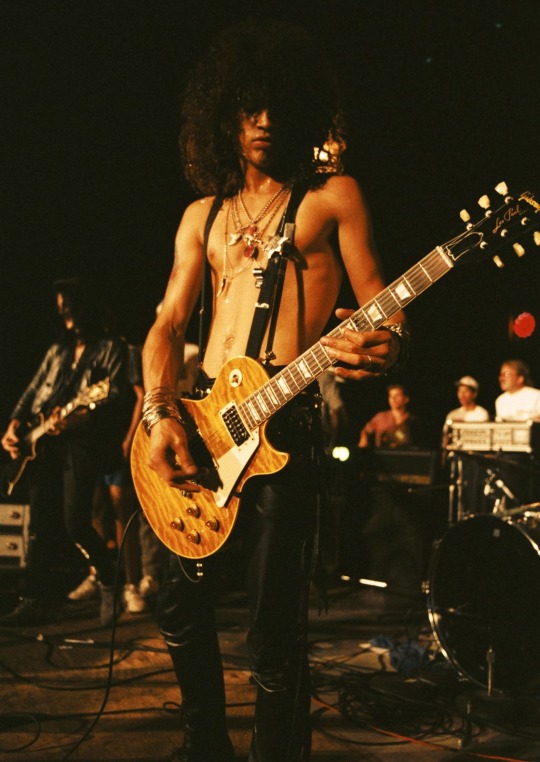
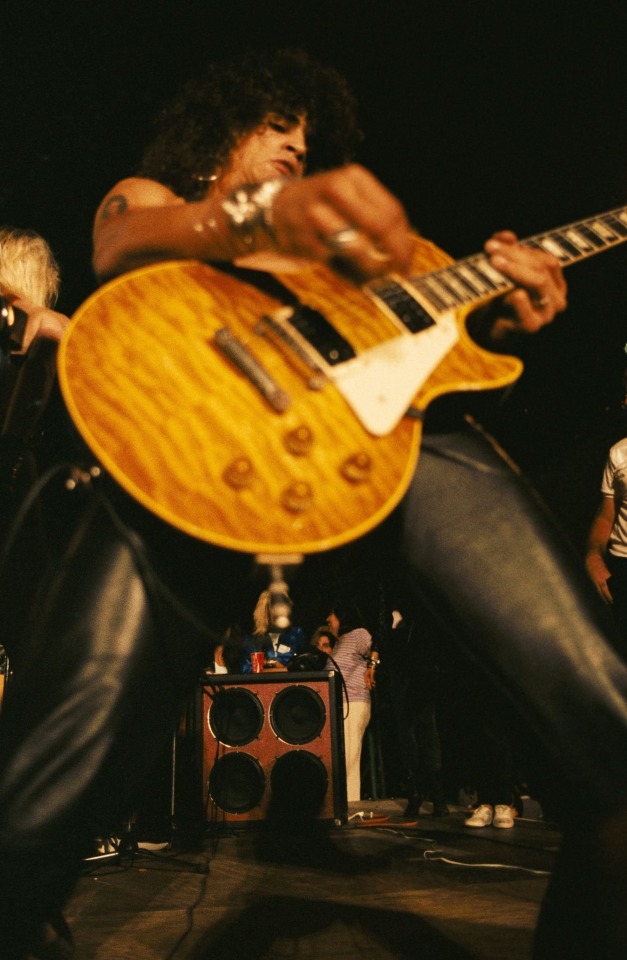
September 28, 1985 ♪ L.A. Street Scene Festival
“One of the more memorable gigs from the era was an outdoor festival called the ‘Street Scene’ that took place on six or seven stages in downtown Los Angeles that occupied a circuit of city blocks. It was our first time playing it and we were scheduled to open for Fear, the only L.A. punk band that I really cared about. [...] We finally got close enough to the stage to realise there was no stage; Fear’s fans had overzealously rioted and torn it down before the band even went on. Our manager, Vicky, and I wandered around this huge mess in an attempt to find us a slot somewhere on the day-long bill. We pushed our way from stage to stage talking to the organisers, looking for an opening until we found one—playing after Social Distortion. It didn’t sound like the best idea, following a loyally beloved local punk band, but it actually turned out to be one of the greatest gigs we ever did. The audience was full on punk and still bloodthirsty after just having seen Social Distortion. We got up there and ripped into our set, and within the first thirty seconds, the show became a spitting contest between us and the first five rows; their fans fucking spit on us, so we just spit on them back. It was hilarious and memorably sickening: I remember going over to Izzy’s side of the stage and standing there beside him and spitting back and forth with these people because that’s the band we were. [...] By the end of our set, this disgusting war of the wills became fucking fun. We ended up with green phlegm all over us, and considering that it was warm out, not only was I shirtless, but the heat cooked the spit and made it start to smell pretty bad.”—Slash (excerpt from his autobiography)
📸 Marc Canter
79 notes
·
View notes
